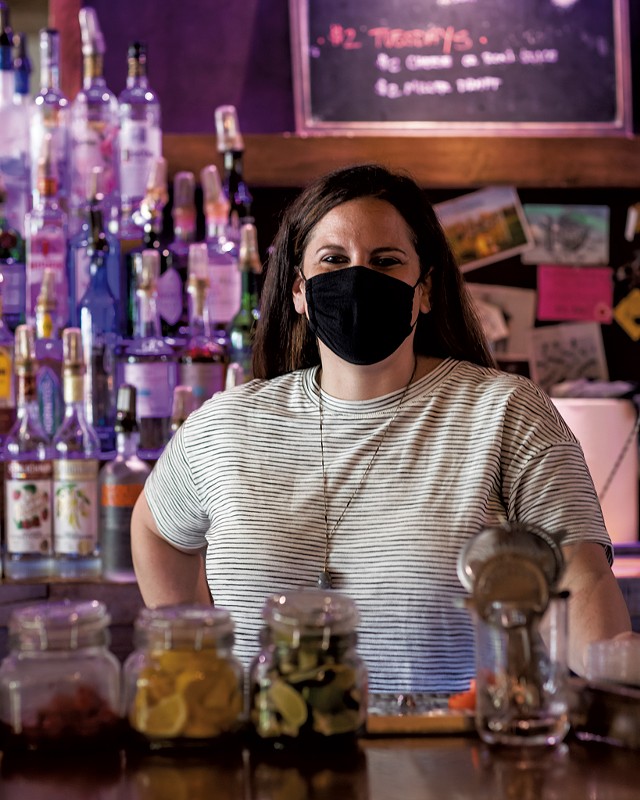
- Luke Awtry
- Ali Nagle
A chalkboard that hangs above a high-top table at the Monkey House in Winooski bears a message in faded white printing: "Fuck U Covid & Trump." Those words have remained in place since a customer wrote them last summer. Nearly everything else at the bar has been in a swirl of change and disruption.
Since the pandemic arrived in Vermont, the Monkey House has been open, closed, open, closed and open again, in accordance with state regulations. Customers can get a cocktail to-go, but they can't sit at the bar. They can eat a slice of pepperoni pizza, made in-house, but they're not allowed to walk around the room. Live music is on hiatus, and last call is by 10 p.m.
The job of implementing and managing these changes, as well as serving drinks to an antsy public, belongs to Ali Nagle. She's general manager of the Monkey House and its affiliated catering business, Fluid Bar Service; she's also co-owner of Waking Windows Music & Arts Festival.
"It's very confusing," Nagle said of the evolving regulations. "We're sticking with the previous rules at least until June, just to get everybody back comfortable again." (She was referring to the state's relatively new "universal" guidelines.)
Nagle, 35, is a graduate of Saint Michael's College, where she majored in sociology and anthropology. After graduation, she worked in social services and hung out at the Monkey House, where her boyfriend — now husband, Brian — worked. Nagle became friends with the crew at the club and started working there part time, checking IDs and collecting money for the band.
Soon, Nagle was learning to be a bartender, working the Saturday and Sunday day shifts. That's when the spillover crowd from Sneakers, a neighboring business, waited for their brunch tables at the Monkey House.
"People want coffee, Bloody Marys, Diet Coke and water," Nagle said. "That's one person [ordering]. So, you learn to multitask."
In 2011, she was the offered a management position at the Monkey House and decided to make a career change. But Nagle notes that she regularly puts her sociology degree to use in this work.
"Even managing a bar, most of my job is managing people and personalities and schedules," Nagle said. "You have so many different types of personalities that either work for you or come into the bar. It's just wild."
Before the Monkey House opened on a recent afternoon, Nagle talked to Seven Days about work life, tequila and running a bar during a pandemic.
"I think there are a lot of people who don't feel comfortable going out, but then there are people who felt judged for going out," she noted. "There's a lot of weird COVID shaming. You have to learn to be respectful of people's comfort levels."
SEVEN DAYS: How did you keep up your chitchat skills during the months when bars in Vermont were closed?
ALI NAGLE: I didn't, really. I did a lot less talking, which was actually kind of nice. There was a lot of alone time, which I enjoyed, and I was a little nervous to come back.
A lot of the same conservations were happening during COVID: "How are you doing? What're you doing?" It's a long day when you're having the same conversation with people, [yet] we all need that interaction. It's hard to keep up a conversation when not much is going on in people's lives. Then you'd see a friend and you don't want the conversation to end. You were so excited to be with them.
SD: Sports and the weather are timeless barroom topics. Have you found the conversation has shifted during pandemic drinking?
AN: Vaccinations are a big one, which we kind of joke about, because you ask people and talk about it, and then laugh at yourself for continuing to do that. "Oh, which one did you get?" It's so silly, but you still ask.
It's a lot of, "How are you?" [And they reply,] "You know, COVID good."
SD: Bartending has always had an enforcer aspect to it. How has COVID-19 changed what you're on the lookout for? Does the general tenor of a barroom feel different?
AN: It does. People, thankfully, kept it more calm. They would only have one or two drinks, rather than four or five. I think it was [because] they were not used to being out, and [they were thinking], I'm going out, but I don't know if I should be going out.
The curfew being early [10 p.m.] has been nice. Once it starts getting rowdy, it's time to go. The other day we had a couple of birthday parties in here. It was loud and exciting and fun, but it felt kind of weird.
Thankfully, I haven't really had to cut people off during COVID. I think we'll get there. I think people are ready to party this summer.
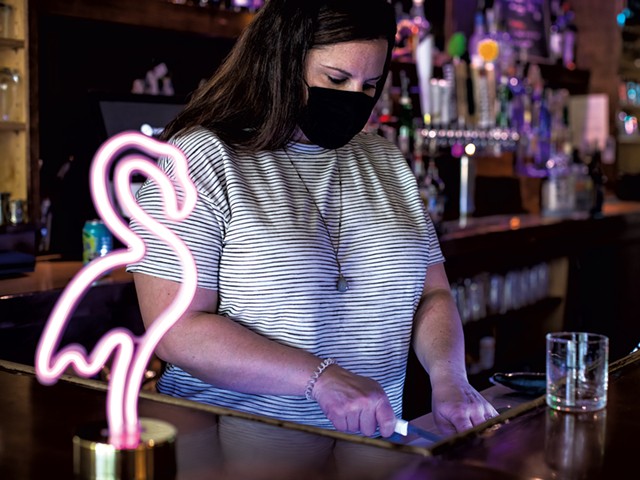
- Luke Awtry
- Ali Nagle
SD: Winooski has become a dining and drinking destination over the past 10 or so years. Have industry people left town in the past year? If so, what will bring them back?
AN: I have noticed some folks have wanted to change career paths or do something new. I've had one employee who took a different direction [due to] the pandemic. Most of the people I know are staying in the industry.
People in the service industry hustle so much. They work long hours and are on their feet. I learned during the pandemic [that] I don't have to be busy 24-7 and have better values [and recognition] for what you want your lifestyle to be. And I think a lot of people in the industry felt the same.
You don't have to drink every night. You don't have to eat out every night. Those things are great, but it's maybe not the best for your lifestyle. I think a lot of people in the industry have changed their priorities.
SD: How and when do you start your day after a late-night shift at the bar?
AN: Pre-COVID, the bar would be open until 2 [a.m.], and you would get home between 3 and 4 in the morning and wind down and go to bed at 5, because you're watching TV and having a snack.
I would try to not sleep in too late on those days, to still have a full day; but you kind of feel out of it, not having a full sleep. I'm really loving the 10 p.m. curfew. This time of year, I like to make breakfast and coffee and set up on the porch and catch up on email and ease into the day.
SD: Do you think the drinking age should be lowered to 18?
AN: I don't think so. I think it does its job at 21. It's not like you're not drinking at 18, but I don't think we need 18- to 21-year-olds coming into the bar. That's what house parties are for, at least when I was that age. And who wants to miss the house-party time?
SD: What mixed drink and Vermont beer are popular these days? What do you think more people should try?
AN: Speaking for here only, the most popular drinks are a blueberry-lavender spritzer and, for beer, I'd say Fiddlehead. And margaritas are back in the swing; we're selling a ton of margaritas.
I think people should start giving tequila more of a chance, if they hadn't before. It's such a nice spirit that some people are scared of or they just take shots of. But really, a nice sipping tequila on ice...
SD: When do you expect live music to return to the Monkey House?
AN: Our goal is July-ish. We don't want to host music while there's rules attached to it. It's too hard. If somebody wanted to get up and dance, we have to tell people they couldn't.
I know people are missing it a lot. I don't think people realize how much work on the back end goes into having music in the pandemic. But we'll do it again.
SD: How did you approach running a bar during a pandemic, when bars were considered risky places?
AN: It was really hard. Every day something changed. Every day, you are concerned: Am I going to have to close today because someone gets COVID?
It was really a blessing in disguise having the governor shut down bars over the winter. At first it was, Oh man, we were just starting to get busy. But just having your staff live with other people, and those other people work[ing] at restaurants, [creates] the chance to get COVID. And then having to close, and closing and opening, was so stressful.
I wanted to stay relevant. I learned so many new skills and trained people [on] how they should be acting [during] COVID. The customer is not necessarily right anymore, which is nice. But we're still thankful for them coming out and being out, and we [want to] make them comfortable.
It's just a stressful balancing act. I feel thankful we didn't have anything too crazy happen to us or the staff. And I do feel thankful with how much I've grown and learned, but it's been a challenge. My brain doesn't really work anymore. My brain is done for a while.
This interview has been edited and condensed for clarity and length.
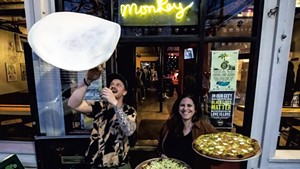

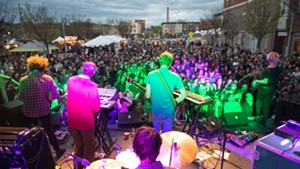
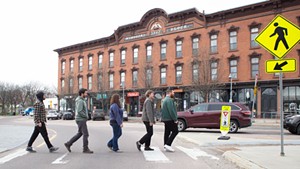









Comments
Comments are closed.
From 2014-2020, Seven Days allowed readers to comment on all stories posted on our website. While we've appreciated the suggestions and insights, right now Seven Days is prioritizing our core mission — producing high-quality, responsible local journalism — over moderating online debates between readers.
To criticize, correct or praise our reporting, please send us a letter to the editor or send us a tip. We’ll check it out and report the results.
Online comments may return when we have better tech tools for managing them. Thanks for reading.